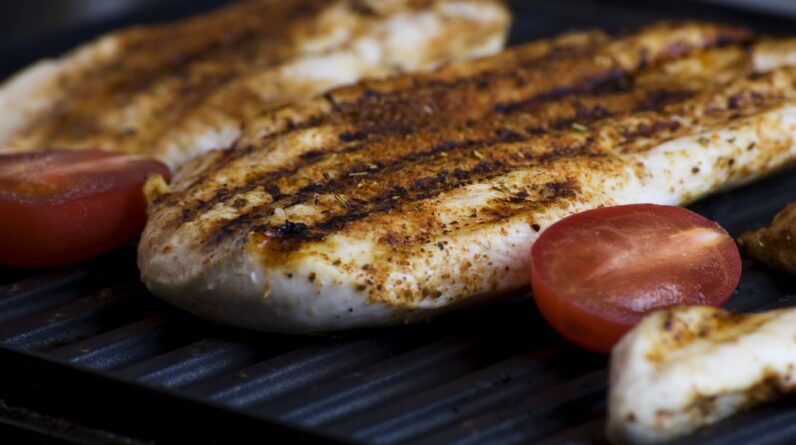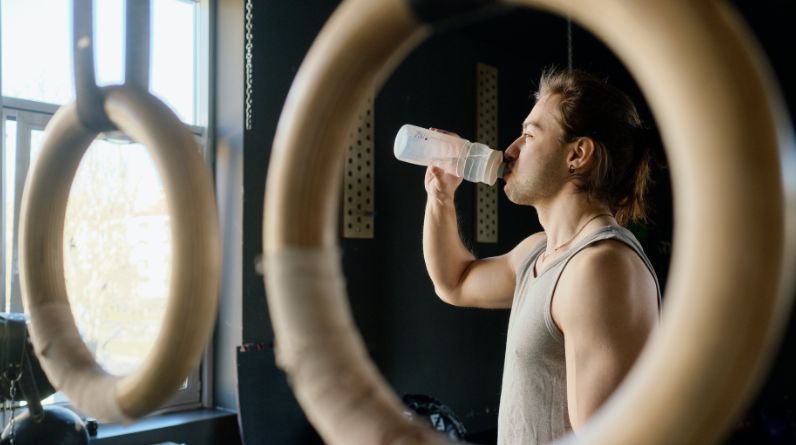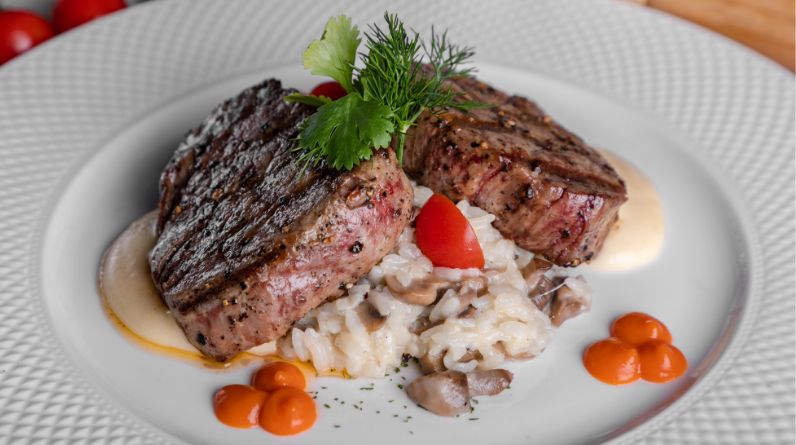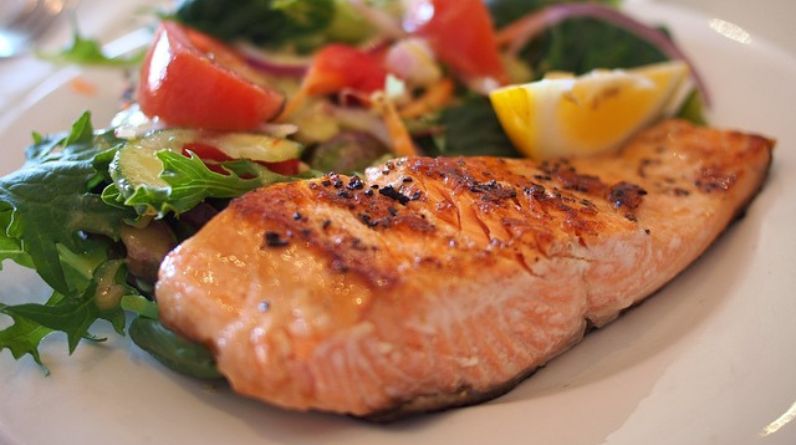
You’ve seen them at the gym, those bodybuilders who look like they could bench press a small car. How do they do it? Besides dedication and a ton of hard work, there’s one little secret ingredient: protein. Yep, that’s right, the stuff that makes up a good chunk of what’s on your dinner plate. But it’s not just any protein; it’s the superstar of muscle building. In this protein-packed journey, we’re going to explore the role of this mighty macronutrient in sculpting those bulging biceps and washboard abs.
The Protein Basics
Before we dive into the deep end of the protein pool, let’s start with the basics. What is protein, anyway? Well, it’s one of the three macronutrients that make up your diet (the other two are fats and carbohydrates). Think of proteins as the body’s building blocks, and not just for muscles. They’re essential for the growth, repair, and maintenance of almost every cell and tissue in your body.
Muscle Magic
Now, let’s talk about the muscle magic. When you work out, whether you’re lifting weights or doing some hardcore yoga, you’re actually causing tiny tears in your muscle fibers. Sounds painful, right? But fear not, this is a good thing. Your body is pretty smart, and it knows how to fix these little tears. That’s where protein comes in.
The Repair Crew
Protein is like the repair crew that rushes to the scene when those muscle fibers are damaged. It swoops in and starts patching things up, making your muscles even stronger in the process. It’s like having a team of construction workers rebuilding a bridge to be even sturdier than before.
The Protein Puzzle
So, how much protein do you actually need? Well, it depends on a few factors, like your age, sex, weight, and activity level. But as a general rule, if you’re looking to build muscle, you’ll want to aim for about 1.2 to 2.2 grams of protein per kilogram of body weight. If math isn’t your strong suit, just know that it’s a bit more than the average person needs.
Protein Sources
Okay, you know you need protein, but where do you get it? Well, the good news is that protein is hiding in all sorts of tasty foods. There are the classics like chicken, beef, and fish, but don’t forget about plant-based sources like tofu, lentils, and chickpeas. Eggs, dairy products, and even some grains like quinoa are also packed with protein.
Timing Matters
When it comes to protein, timing matters. You don’t want your muscles waiting around for that repair crew to show up. That’s why many bodybuilders swear by the “anabolic window.” This is the magical period right after your workout when your muscles are like sponges, ready to soak up all that protein goodness. Try to get some protein in your system within an hour or two after exercise for maximum muscle-building benefits.
Shake It Up
If you’re serious about muscle building, you might want to consider adding protein shakes to your routine. They’re a quick and easy way to get that post-workout protein fix. Plus, they come in all sorts of delicious flavors, so it’s like having dessert without the guilt.
Protein and Weight Loss
Protein isn’t just for bulking up; it can also help you slim down. When you eat protein-rich foods, they can help you feel full and satisfied, which means you’re less likely to reach for that bag of potato chips. Plus, protein requires more energy to digest than carbs or fats, so you burn a few extra calories in the process.
The Dark Side of Protein
While protein is essential, like all good things in life, it’s best in moderation. Consuming too much protein can put stress on your kidneys and lead to dehydration. So, don’t go overboard with the chicken breasts; balance is key.
Variety Is the Spice of Life
Lastly, don’t forget to mix things up. Eating a variety of protein sources ensures that you get a wide range of essential amino acids (the building blocks of protein). Different foods provide different amino acids, so diversify your protein sources to give your body the full spectrum of muscle-building power.
Conclusion
In conclusion, protein is unequivocally the bodybuilder’s best buddy. It’s the cornerstone of muscle building, the foundation upon which Herculean physiques are chiseled, and the architect behind strength and vitality. As we’ve ventured through the protein-packed journey of muscle growth, we’ve uncovered its multifaceted role.
Protein is the builder, mason, and sculptor of muscle tissue. It’s the catalyst that triggers muscle protein synthesis, the process responsible for muscle repair and growth. Whether you’re a seasoned bodybuilder or just stepping into the gym, the significance of protein in your diet cannot be overstated.
From lean meats to plant-based sources, from eggs to dairy, protein-rich foods are your allies in the quest for muscle supremacy. But, it’s not just about quantity; it’s also about timing. Consuming protein before and after your workouts primes your muscles for growth and aids in recovery.
And let’s not forget about the convenience of protein shakes, a quick and effective way to meet your protein needs, especially when life gets busy. These shakes are not just a drink; they’re the elixir of recovery and progress.
But, as in all things, balance is key. While protein is essential, remember that a diet overloaded with it won’t necessarily accelerate muscle growth. You need the right mix of macronutrients, including carbs and healthy fats, to provide energy and support overall health.
So, fellow bodybuilders, as you lift those weights, sweat it out on the mats, and push your limits day after day, let protein be your unwavering companion. It’s your ally in the relentless pursuit of muscle, the secret weapon in your arsenal. Embrace its power, savor its benefits, and let it sculpt your body into a work of art.
As you journey through the realm of muscle building, remember that you’re not alone. Protein is there, in every chicken breast, every tofu cube, and every scoop of that post-workout shake, fueling your dreams of a stronger, more muscular you. Together, with determination, consistency, and the right nutrition, you’ll conquer new heights in muscle building.
Frequently Asked Questions
1. How much protein is necessary for muscular growth?
The amount of protein you need depends on factors like your weight, age, and activity level. As a general guideline, aim for 1.2 to 2.2 grams of protein per kilogram of body weight if you’re looking to build muscle.
To calculate your specific protein needs, multiply your weight in kilograms by the recommended protein range. For example, if you weigh 70 kilograms and want to build muscle, you’d aim for 84 to 154 grams of protein per day (70 kg x 1.2 to 2.2 g/kg).
2. Is a vegetarian or vegan diet sufficient for me to acquire enough protein?
Absolutely! Many plant-based foods are rich in protein, such as tofu, lentils, chickpeas, quinoa, and tempeh. Incorporating a variety of these sources into your diet can provide all the protein your body needs for muscle building.
Plant-based diets can be excellent for muscle building, as they often contain less saturated fat and cholesterol than animal-based diets. Just be sure to include a wide range of plant protein sources to ensure you get all the essential amino acids your body requires for muscle growth.
3. Is it better to get protein from whole foods or supplements?
Whole foods should be your primary source of protein, as they come with essential nutrients and fiber. However, protein supplements like shakes or bars can be convenient for post-workout recovery or when you’re in a hurry.
Whole foods provide a broader spectrum of nutrients that benefit your overall health. However, protein supplements can be useful for meeting your daily protein goals, especially if you’re unable to consume enough protein through meals alone or need a quick post-workout option.
4. Is it true that I should eat protein immediately after a workout?
While there’s a “window of opportunity” after exercise when your muscles are primed for protein uptake, it’s not a strict requirement. Consuming protein within an hour or two post-workout is beneficial, but the overall distribution of protein throughout your day matters more than the exact timing.
Don’t stress too much about hitting that post-workout protein target down to the minute. As long as you consume protein-rich meals within a reasonable time frame after your workout, your muscles will still benefit from the repair and growth process.
5. Can I build muscle without consuming meat?
Absolutely! Meat is just one protein source among many. Vegetarians and vegans can build muscle effectively by incorporating a variety of plant-based protein sources like beans, nuts, seeds, tofu, and tempeh into their diets.
Meatless diets can provide all the essential amino acids needed for muscle building. The key is diversifying your protein sources to ensure you get a wide range of nutrients.
6. Is it possible to overdo protein intake?
Yes, it’s possible to overconsume protein, which can strain your kidneys and lead to dehydration. It’s essential to strike a balance and not excessively exceed your daily protein needs.
Excessive protein intake, especially from supplements, can tax your kidneys as they work to process and eliminate excess nitrogen from protein breakdown. Staying hydrated and moderating your protein intake is crucial for long-term health.
7. Can protein help with weight loss?
Yes, protein can aid in weight loss by increasing feelings of fullness and requiring more energy for digestion. Including protein-rich foods in your diet can help control your appetite and support a calorie deficit, contributing to weight loss.
Protein’s ability to keep you feeling full can lead to reduced calorie intake, making it easier to stick to a weight loss plan. Additionally, protein’s thermic effect means your body burns more calories digesting it compared to fats or carbs.
8. Can I consume too much protein in a single meal?
While there’s no strict limit for protein intake per meal, it’s generally more effective to distribute your protein consumption evenly throughout the day. Spacing out your protein intake can maximize muscle protein synthesis and overall protein utilization.
Your body can only use a certain amount of protein at a time for muscle building. By spreading your protein intake across meals and snacks, you provide a continuous supply of amino acids to support muscle repair and growth.
9. Can I replace meals with protein shakes for muscle building?
While protein shakes can supplement your protein intake, it’s generally not advisable to replace whole meals with shakes for long-term muscle building. A wider variety of nutrients found in whole meals are critical for good general health.
Whole meals provide not only protein but also important vitamins, minerals, fiber, and other nutrients. Relying solely on protein shakes may lead to nutrient deficiencies over time.
10. Does the type of protein source matter for muscle building?
Yes, the type of protein source can matter, but it’s not the only factor. While animal-based proteins are complete proteins containing all essential amino acids, plant-based sources can be equally effective when combined to provide a full range of amino acids.
The key is to ensure you get a variety of protein sources, whether animal or plant-based, to cover all essential amino acids your body needs for muscle building. A well-balanced diet with diverse protein sources is the most effective approach.






